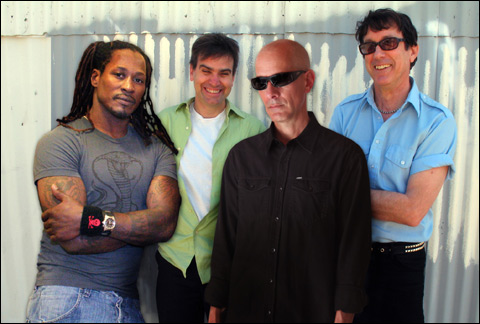
CALIFORNIA ÜBER ALTERED: Ron “Skip” Greer (second from left) takes on vocal duties in the 2010 version of Dead Kennedys, under the watchful eye of East Bay Ray (far right). |
"Every artist is a business." If you're a fan of the legendary and incendiary punk band Dead Kennedys, you'd probably be dismayed to hear those words exit the lips of guitarist and band co-founder Ray Pepperell, a/k/a East Bay Ray. I mean, we know that stadium-filling acts are business-like, employing teams of roadies and agents and whatnot to keep their corporate music afloat. But surely the purpose of the punk movement was to oppose the concept of an artist as a business, right? Perhaps, perhaps — but in the dispiriting case of Dead Kennedys, a youthful partnership based in righteous solidarity soured to the point where the most anti-corporate punk band of the '80s were forced to display their business dealings for all their devout followers to see.
I spoke to Ray on the eve of a Dead Kennedys tour that will bring them to the Paradise this Wednesday. In tow is D.H. Peligro, who, though not the band's first drummer, commanded the beat through the majority of the DK discography, up through their hardcore-ish swan song, 1986's Bedtime for Democracy. Greg Reeves is subbing for original bassist Geoffrey Lyall, a/k/a Klaus Flouride, who is sitting the trip out for what are dubbed "personal reasons" but has otherwise lugged his bass on every DK tour since the group's inception in 1978 (and will, I'm told, continue to do so in the future). Vocal duties will be handled by Ron "Skip" Greer, formerly of '90s East Bay pop-punkers Wynona Riders.
Conspicuously absent is the band's most famous member and legendary mouthpiece, Eric Boucher, a/k/a Jello Biafra, who hasn't done music with Ray and company since the Kennedys' 1986 dissolution (although his post-DK résumé is lengthy, from his '80s industrial work with Lard to his most recent project, the punkish Guantánamo School of Medicine). Along with Ray, Biafra founded Alternative Tentacles Records, the independent label that, for many in the '80s, was a shining beacon to those who would free music from corporate hegemony. When the band split, Biafra, already a burgeoning star in the world of left-leaning spoken-word performance art, took the reins of the label himself, with Ray leaving the label to represent the band, or at least their legacy and recorded output.
"Basically," Ray explains in his typically upbeat and slightly professorial manner, "a record label's primary goal is to pay the artist as little as possible. So once the band was all done, there seemed to be a conflict of interest, and we thought by having it divided like that, with me running the 'band' and Biafra running the label, that we could make things fair."
This arrangement seemed to work well for all involved — mostly because, post-mortem, Dead Kennedys went from being a reasonably successful underground touring band to a legendary punk act whose instantly recognizable logo (a four-line "DK" created by the band's in-house artist, collagist Winston Smith) appeared on jean jackets and was spray-painted on walls decades after the band had called it quits. It worked for Biafra and Alternative Tentacles, since DK album sales pretty much floated the rest of the label. And it worked for the former band members, who were able to live relatively comfortable lives on royalties from sales of the band's back catalogue.